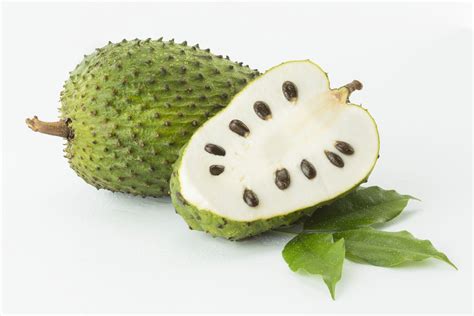Soursop (also called graviola, guyabano, and in Hispanic America, guanábana) is the fruit of Annona muricata, a broadleaf, flowering, evergreen tree.
The exact origin is unknown; it is native to the tropical regions of the Americas and the Caribbean and is widely propagated.
It is in the same genus, Annona, as cherimoya and is in the Annonaceae family.
The soursop is adapted to areas of high humidity and relatively warm winters; temperatures below 5 °C (41 °F) will cause damage to leaves and small branches, and temperatures below 3 °C (37 °F) can be fatal. The fruit becomes dry and is no longer good for concentrate.
With an aroma similar to pineapple,the flavor of the fruit has been described as a combination of strawberries and apple with sour citrus flavor notes, contrasting with an underlying thick creamy texture reminiscent of banana.
The flesh of the fruit consists of an edible, white pulp, some fiber, and a core of indigestible black seeds. The pulp is also used to make fruit nectar, smoothies, fruit juice drinks, as well as candies, sorbets, and ice cream flavorings.
Due to the fruit's widespread cultivation, its derivative products are consumed in many countries like Mexico, Brazil, Venezuela, Colombia and Fiji.
The seeds are normally left in the preparation, and removed while consuming, unless a blender is used for processing.
In Indonesia, dodol sirsak, a sweet, is made by boiling soursop pulp in water and adding sugar until the mixture caramelizes and hardens. Soursop is also a common ingredient for making fresh fruit juices that are sold by street food vendors.
In the Philippines, it is called guyabano, derived from the Spanish guanábana, and is eaten ripe, or used to make juices, smoothies, or ice cream. Sometimes, the leaf is used in tenderizing meat.
In Vietnam, this fruit is called mãng cầu Xiêm (Siamese Soursop) in the south, or mãng cầu (Soursop) in the north, and is used to make smoothies, or eaten as is.
In Cambodia, this fruit is called tearb barung, literally "western custard-apple fruit."
In Malaysia, it is known in Malay as durian belanda ("Dutch durian") and in East Malaysia, specifically among the Dusun people of Sabah, it is locally known as lampun. Popularly, it is eaten raw when it ripens, or used as one of the ingredients in Ais Kacang or Ais Batu Campur. Usually the fruits are taken from the tree when they mature and left to ripen in a dark corner, whereafter they will be eaten when they are fully ripe. It has a white flower with a very pleasing scent, especially in the morning.
While for people in Brunei Darussalam this fruit is popularly known as "Durian Salat", widely available and easily planted.
Soursop leaves are sold and consumed in Indonesia as herbal medicine. The leaves are usually boiled to make tea.
If you ever want to make your own megathread, you can go here to reserve a spot! :xinternet:
Resources for Organizing your workplace/community :sabo:
Resources for Palestine :palestine-heart:
Buy coffee and learn more about the Zapatistas in Chiapas here :EZLN:
Here are some resourses on Prison Abolition :brick-police:
Foundations of Leninism :USSR:
:lenin-shining: :unity: :kropotkin-shining:
Anarchism and Other Essays :ancom:
Remember, sort by new you :LIB:
Follow the Hexbear twitter account :comrade-birdie:
THEORY; it’s good for what ails you (all kinds of tendencies inside!) :RIchard-D-Wolff:
Come listen to music with your fellow Hexbears in Cy.tube :og-hex-bear:
Queer stuff? Come talk in the queer megathread! ! :sicko-queer:
Monthly Neurodiverse Megathread and Monthly ND Venting Thread :Care-Comrade:



everyone knows exothermic reactions are counter-revolutionary
which is why the rapid industrialization of the USSR and China was a mistake.
mistakes that had to be made unfortunately :deeper-sadness: